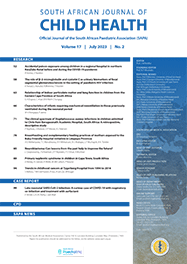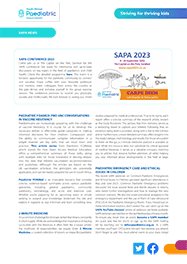Research

Training, confidence and knowledge of healthcare workers with regard to HIV and infant feeding in eThekwini, South Africa
Abstract
Background. Healthcare workers play an important role in educating mothers living with HIV regarding appropriate infant and young child feeding (IYCF) practices. However, it is not known if healthcare workers in eThekwini, KwaZulu-Natal (KZN), have been adequately trained regarding IYCF in the context of HIV and how knowledgeable and confident they are.
Objectives. To assess the training, confidence and knowledge of healthcare workers regarding IYCF in the context of HIV.
Methods. This was a descriptive cross-sectional study, which used a self-administered questionnaire developed for this survey. Healthcare workers (n=188), primarily doctors and nurses in antiretroviral, antenatal and paediatric departments at three regional hospitals (Addington Hospital, Prince Mshiyeni Memorial Hospital and RK Khan Hospital) in eThekwini, KZN, participated.
Results. Only 47.3% (n=89) of the participants had attended formal training on IYCF in the context of HIV. Most participants (n=171; 91.4%) felt they required more training. The mean overall confidence score of the group was 4.54 (standard deviation (SD) 1.28)%. The mean knowledge score of participants regarding IYCF in the context of HIV was 51.7%. The attendance of training did not equate to improved knowledge scores.
Conclusions. Although the healthcare workers were confident with counselling on IYCF in the context of HIV, their knowledge levels were lower than expected. This could be attributed to a lack of training or outdated or inefficient training. There is a need to improve the coverage and quality of IYCF and HIV training. Training courses should address behaviour change and test for understanding.
Authors' affiliations
K A Fiddler, Department of Dietetics and Human Nutrition, College of Agriculture, Engineering and Science, University of KwaZulu-Natal, Pietermaritzburg, South Africa
K Pillay, Department of Dietetics and Human Nutrition, College of Agriculture, Engineering and Science, University of KwaZulu-Natal, Pietermaritzburg, South Africa
Full Text
Cite this article
Article History
Date published: 2022-07-22
Article Views
Full text views: 396

.jpg)



Comments on this article
*Read our policy for posting comments here